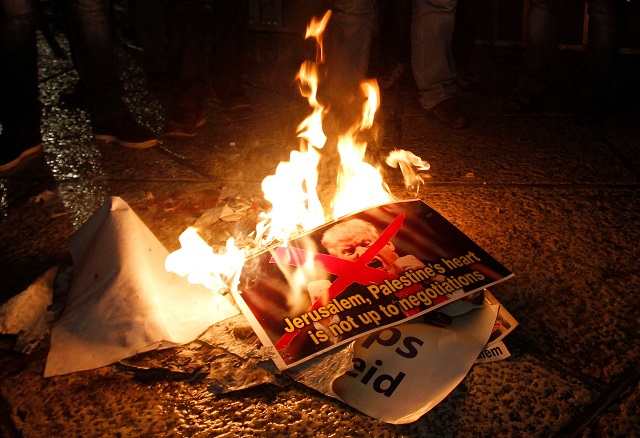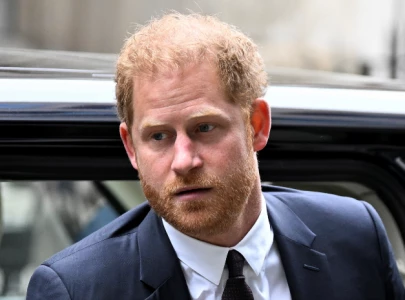
Palestinian factions called for a "Day of Rage" on Friday, and on Thursday a wave of protest in the West Bank and Gaza brought clashes between Palestinians and Israeli troops.
At least 31 people were wounded by Israeli gunfire and rubber bullets, medics said. The Israeli military said on Thursday evening two rockets had been fired towards Israel from the Hamas-ruled Gaza Strip, but did not cross into Israeli territory. The military said it was reinforcing troops in the occupied West Bank. Medics said 11 people had been hit by live bullets and 20 by rubber bullets in the Thursday unrest. One was in a critical condition.
Some protesters threw rocks at soldiers and others chanted: "Death to America! Death to the fool Trump!" Trump reversed decades of US policy on Wednesday by recognising Jerusalem as the capital of Israel, angering the Arab world and upsetting Western allies.
The status of Jerusalem - home to sites holy to the Muslim, Jewish and Christian religions - is one of the biggest obstacles to a peace agreement between Israel and the Palestinians.
"We should call for and we should work on launching an intifada (Palestinian uprising) in the face of the Zionist enemy," Hamas leader Ismail Haniyeh said in a speech in Gaza.
On Friday's "Day of Rage", rallies and protests are expected near Israeli-controlled checkpoints in the West Bank and along the border with Gaza. Friday prayers at the Muslim shrine of Al-Aqsa mosque in Jerusalem could also be a flashpoint. Naser Al-Qidwa, an aide to Western-backed Palestinian President Mahmoud Abbas and senior official in his Fatah party, urged Palestinians to stage protests but said they should be peaceful.
Abbas on Thursday met Jordan's King Abdullah, whose dynasty is traditional custodian of Jerusalem's holy places. Jordan is a staunch US ally but has dismissed Trump's move as "legally null". Palestinian news agency Wafa said Abbas updated the king on "the imminent dangers in light of the decision by US President Donald Trump to recognise Jerusalem as the capital of the occupation state, and the mechanism of future steps to protect the holy city". Israel considers Jerusalem its eternal and indivisible capital.
Palestinians want the capital of an independent state of their own to be in the city's eastern sector, which Israel captured in the 1967 Middle East war and annexed in a move never recognised internationally.
Trump ‘immortalised’
Trump announced his administration would begin a process of moving the US Embassy in Tel Aviv to Jerusalem, a step expected to take years, a move his predecessors opted not to take to avoid inflaming tensions.
Israeli Prime Minister Benjamin Netanyahu hailed Trump's announcement as a "historic landmark" and said many countries would follow the US move and contacts were under way. He did not name the countries.
"President Trump has immortalised himself in the chronicles of our capital. His name will now be held aloft, alongside other names connected to the glorious history of Jerusalem and of our people," he said in a speech at Israel's Foreign Ministry.
Other close Western allies of Washington, including France and Britain, have been critical of Trump's move. Pope Francis has called for Jerusalem's status quo to be respected, while China and Russia have expressed concern. The EU's foreign policy chief, Federica Mogherini, said: "The European Union has a clear and united position. We believe the only realistic solution to the conflict between Israel and Palestine is based on two states and with Jerusalem as the capital of both."
The United Nations Security Council is likely to meet on Friday to discuss the US decision, diplomats said. Trump's decision has raised doubts about his administration's ability to follow through on a peace effort that his son-in-law and senior adviser, Jared Kushner, has led for months aimed at reviving long-stalled negotiations. Haniyeh called on Abbas to withdraw from peacemaking with Israel and on Arabs to boycott the Trump administration.
Abbas said on Wednesday the United States had abdicated its role as a mediator in peace efforts. "We have given instruction to all Hamas members and to all its wings to be fully ready for any new instructions or orders that may be given to confront this strategic danger that threatens Jerusalem and threatens Palestine," Haniyeh said.
Backlash expected
Israel and the United States consider Hamas, which has fought three wars with Israel since 2007, a terrorist organisation. Hamas does not recognise Israel's right to exist and its suicide bombings helped spearhead the last intifada, from 2000 to 2005. Fearing disruption to reconciliation efforts between Hamas and Fatah, Palestinian Prime Minister Rami Al-Hamdallah and other Fatah delegates arrived in Gaza on Thursday to meet Hamas.
The international community does not recognise Israeli sovereignty over the whole of Jerusalem and no other country has its embassy there. Trump's decision fulfils a campaign promise and will please Republican conservatives and evangelicals. He said his move was not intended to tip the scales in favour of Israel and that any deal involving the future of Jerusalem would have to be negotiated by the parties, but the move was seen almost uniformly in Arab capitals as a sharp tilt towards Israel.
The United States is asking Israel to temper its response to the announcement because Washington expects a backlash and is weighing the potential threat to US facilities and people, according to a State Department document seen by Reuters. "The president has directed me and the State Department to undertake the process to begin an effort to move the embassy," Secretary of State Rex Tillerson said in Vienna. "This is not something that will happen overnight."
In Lebanon, Hezbollah leader Sayyed Hassan Nasrallah backed calls for a new intafada and said: "We are facing blatant American aggression." Islamist militant group Al Qaeda in the Arabian Peninsula said Trump's decision was the result of "normalisation steps" between some Gulf Arab countries and Israel.
"It is also a clear challenge to the Muslim world," the Yemen-based group said. Protests have broken out since Trump's announcement in Jordan, outside the US consulate in Istanbul and in Pakistan. Taliban insurgents in Afghanistan said the United States was "exposing its colonial ambition in Muslim territory". Palestinians switched off Christmas lights on trees outside Bethlehem's Church of the Nativity, where Christians believe Jesus was born, and in Ramallah, next to the burial site of former Palestinian leader Yasser Arafat, in protest.

1731570357-0/elon-musk-(1)1731570357-0-165x106.webp)
-(1)1717678110-0/Kendrick-(1)-(1)1717678110-0-165x106.webp)





1732445375-0/Untitled-design-(9)1732445375-0-270x192.webp)








COMMENTS
Comments are moderated and generally will be posted if they are on-topic and not abusive.
For more information, please see our Comments FAQ